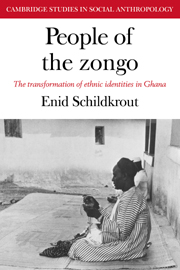Book contents
- Frontmatter
- Contents
- List of tables, figures, and maps
- Preface
- Glossary
- I Ethnicity and migration
- II Kinship and community
- 4 The growth of the zongo community in Kumasi
- 5 Ethnicity and the domestic context
- 6 Ethnicity and the idiom of kinship
- 7 Kinship and marriage in the second generation
- III Politics and change
- Notes
- Bibliography
- Index
6 - Ethnicity and the idiom of kinship
Published online by Cambridge University Press: 29 October 2009
- Frontmatter
- Contents
- List of tables, figures, and maps
- Preface
- Glossary
- I Ethnicity and migration
- II Kinship and community
- 4 The growth of the zongo community in Kumasi
- 5 Ethnicity and the domestic context
- 6 Ethnicity and the idiom of kinship
- 7 Kinship and marriage in the second generation
- III Politics and change
- Notes
- Bibliography
- Index
Summary
Kinship was considered in the last chapter, but only in terms of the composition of houses and the dispersal of kin. In chapter 9, the political aspects of the metaphorical use of kinship terms within the Mossi group will be considered. Here, links of kinship and affinity are discussed, with the aim of contrasting the way these operate within the ethnic community and between members of different communities. Both internal and external relations of members of an ethnic community are in many contexts conceptualized in terms of kinship and affinity. These categories provide complementary models which are used to contrast two sets of interpersonal relationships - those with one's own people, on the one hand, and those with members of other ethnic communities, on the other.
Before developing this idea, it is necessary to clarify my use of the terms specific kinship, generalized kinship, and affinity. Specific kinship is what the immigrants in Kumasi refer to as “real” kinship. It refers to the relationships which people can describe in genealogical terms, accurately specifying each link between the persons concerned, regardless of whether these links derive from biological kinship or, as they sometimes do, from fictive kinship ties. In Kumasi zongo, specific kinship means close kinship, for it obtains almost always between people who have, at most, a common great-grandparent or, even more often, only a common grandparent or parent.
- Type
- Chapter
- Information
- People of the ZongoThe Transformation of Ethnic Identities in Ghana, pp. 138 - 160Publisher: Cambridge University PressPrint publication year: 1978



